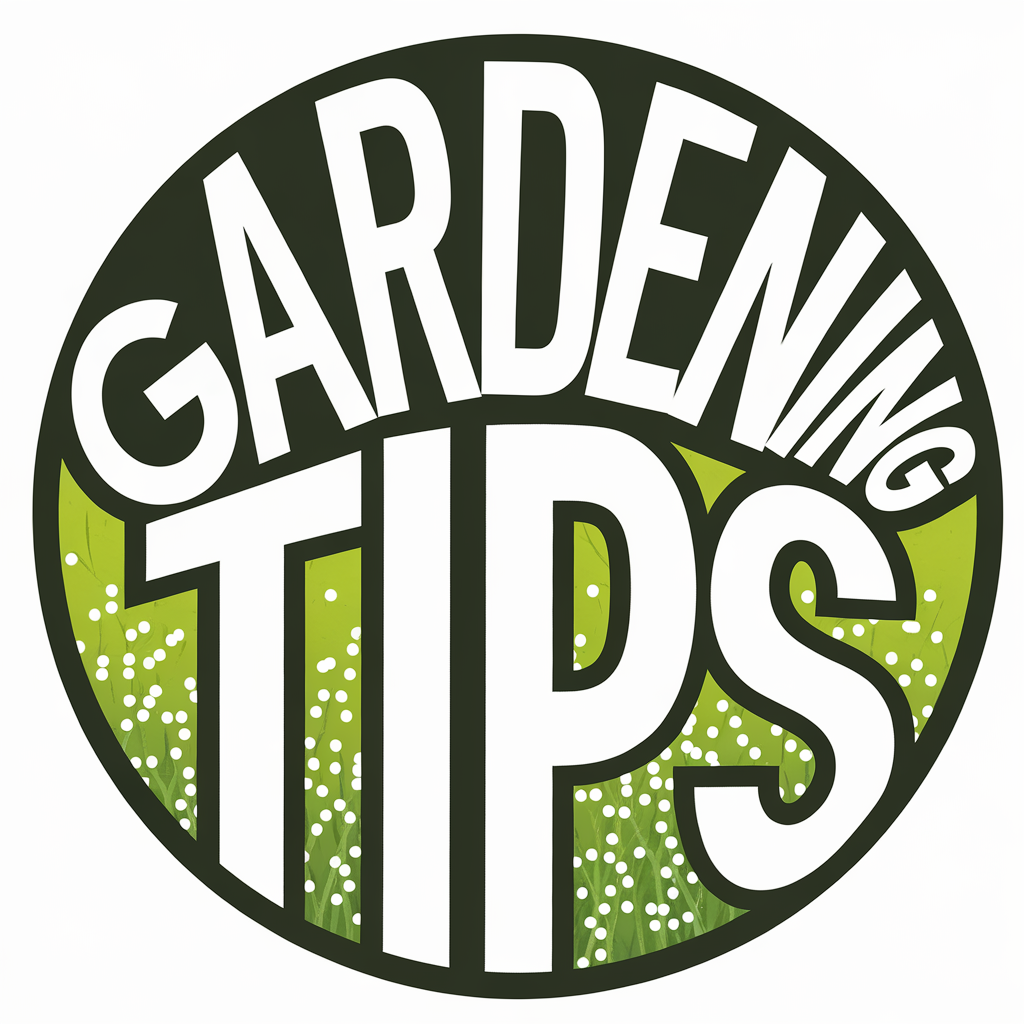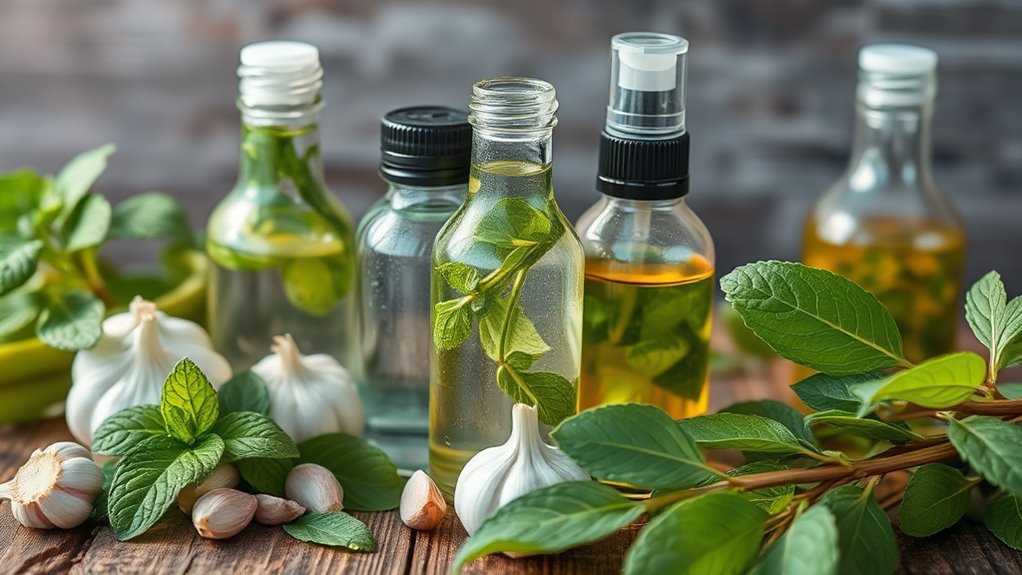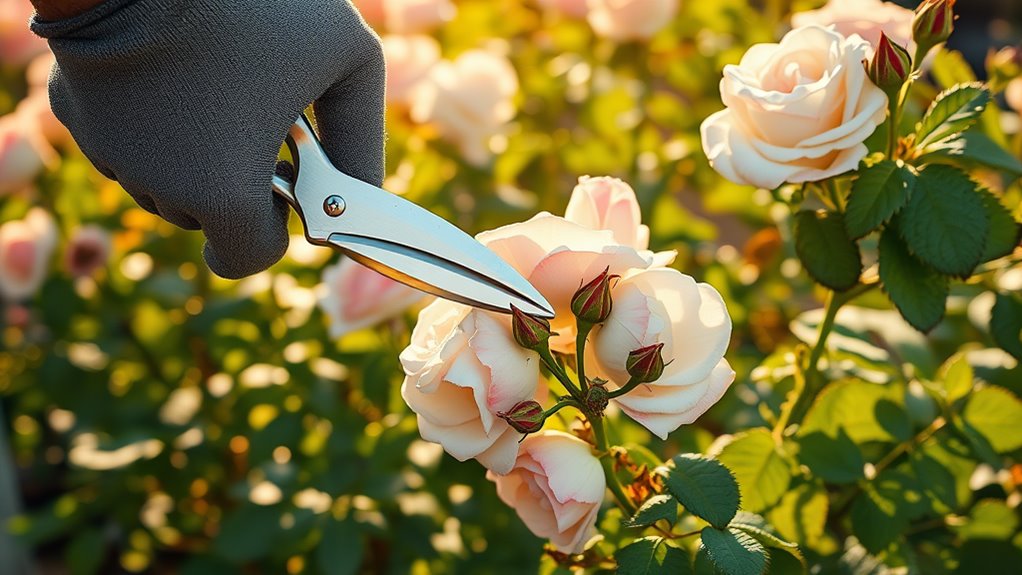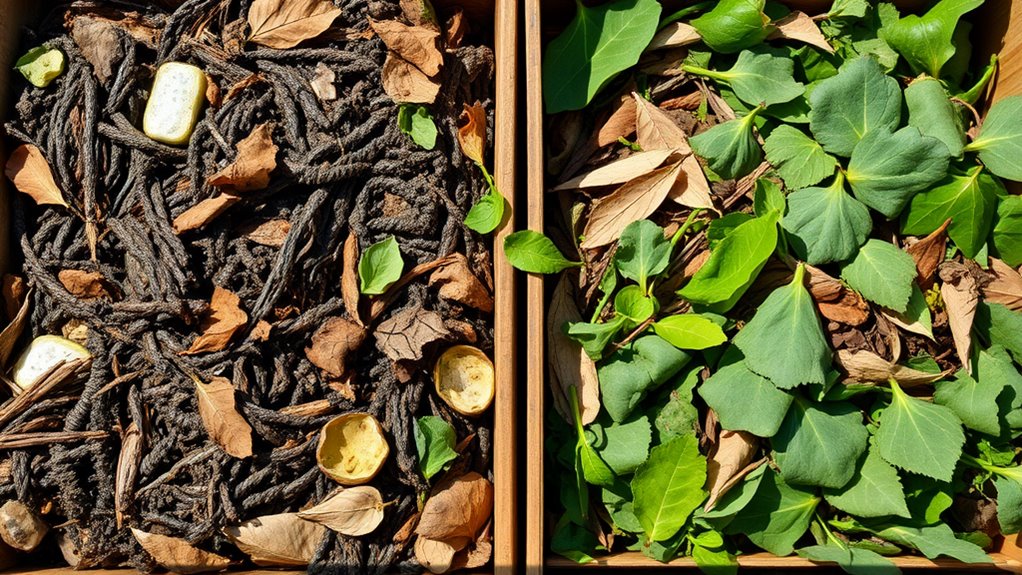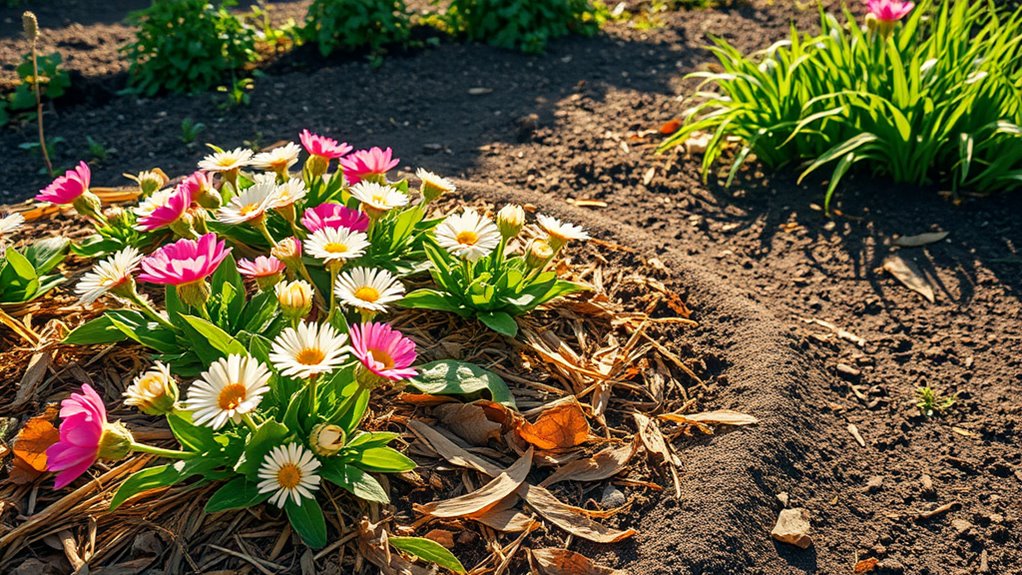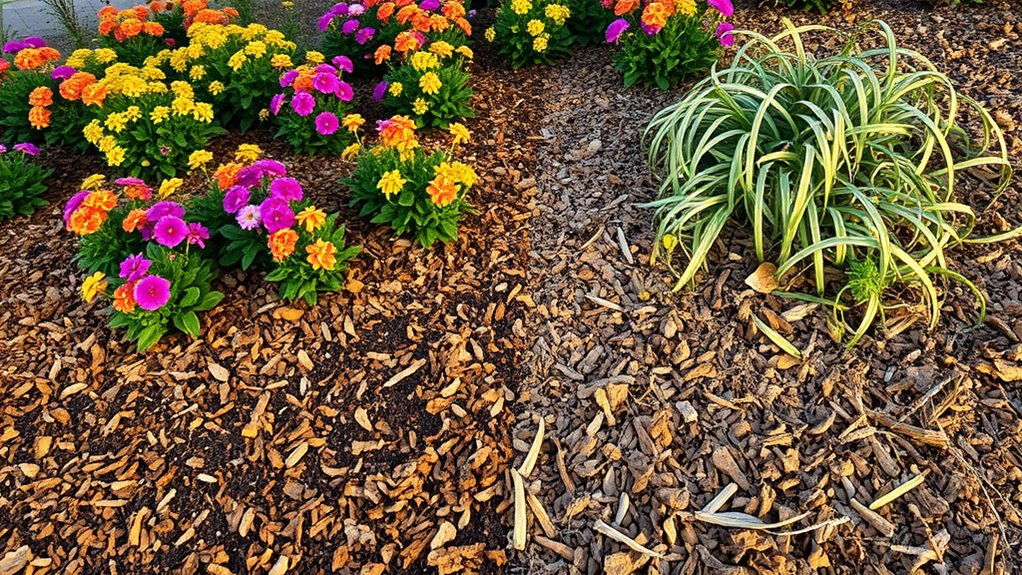The Best Natural Sprays That Actually Work Against Pests
You’ll find neem oil, garlic extracts, and peppermint oil as the top natural sprays that truly work against pests. Studies confirm neem oil reduces infestations by up to 90% by disrupting growth cycles, while garlic offers 70-80% effectiveness against aphids, and peppermint repels via menthol for similar results. These eco-friendly options protect your garden without harming beneficial insects. Check out the detailed recipes and tips that follow for even better results.
Key Takeaways
- Garlic spray, made from crushed cloves steeped in water, effectively repels aphids and spider mites with 70-80% success.
- Neem oil solutions disrupt aphid reproduction, reducing populations by up to 90% when applied every 7-14 days.
- Peppermint oil spray, mixed with water and soap, repels pests with up to 80% efficacy due to menthol properties.
- Vinegar mixtures, like a 1:1 water blend, repel aphids and ants by disrupting their feeding and trails.
- Essential oil blends, combining peppermint and citronella, reduce mosquito attraction by up to 90% for enhanced protection.
Essential Ingredients for Natural Pest Sprays
When you’re crafting natural pest sprays, essential ingredients like neem oil, garlic extract, and essential oils such as peppermint play a pivotal role.
You select neem oil for its proven insecticidal properties, disrupting pests’ growth cycles based on botanical studies.
Garlic extract offers antimicrobial benefits, repelling insects through sulfur compounds, as evidenced in field trials.
Peppermint oil deters pests via menthol, supported by research on its volatile effects.
Together, these form the backbone of organic pest sprays, ensuring eco-friendly efficacy without synthetic chemicals, as confirmed by agricultural science. Exploring unconventional remedies can further enhance your pest control strategies.
Always test formulations for optimal results.
Moreover, incorporating natural herbs can provide additional options for effective pest deterrence in gardens and homes.
Garlic Spray Recipes and Their Effectiveness
Garlic spray recipes offer a simple, effective way to repel pests using everyday ingredients like fresh garlic cloves and water.
You’ll crush several cloves and steep them in boiled water for 24 hours, then strain and dilute the mixture. This creates a spray rich in allicin, garlic’s sulfur compound, which scientific studies confirm deters insects by damaging their nervous systems.
For instance, research in the Journal of Economic Entomology shows it’s 70-80% effective against aphids and spider mites. You apply it directly to plants, reapplying after rain for sustained protection, making it a reliable, eco-friendly option. Additionally, this spray aids in minimizing chemical use by providing an alternative that supports a balanced ecosystem.
This natural remedy is recommended for anyone seeking to maintain a healthy garden without resorting to chemicals.
Neem Oil-Based Solutions for Common Pests
You’ll find that neem oil serves as an effective, evidence-based option for controlling aphids, thanks to its azadirachtin compound that disrupts their feeding and reproduction.
You can apply it to treat spider mites by breaking their life cycles, as supported by studies on its insecticidal properties.
Moreover, you harness its repellent qualities to keep various garden pests at bay, enhancing your natural pest management strategy.
Incorporating neem oil into your pest control routine helps maintain a thriving garden ecosystem.
Neem for Aphids
Neem oil offers a potent, natural defense against aphids, disrupting their feeding and reproduction cycles through its active compound, azadirachtin.
You’ll find it blocks aphid hormones, preventing molting and growth, as studies show up to 90% reduction in populations after applications.
Mix a few teaspoons in water with soap, then spray your plants thoroughly, targeting undersides where aphids hide.
It’s safe for beneficial insects if used correctly, with research from the Journal of Economic Entomology confirming its efficacy without harming pollinators.
Reapply every 7-14 days for best results, ensuring thorough coverage to maximize impact.
Treating Spider Mites
Spider mites pose a significant threat to plants, but you can effectively combat them using Neem oil, which interferes with their feeding and reproductive processes via azadirachtin.
You’ll prepare a solution by diluting Neem oil in water with a mild soap as an emulsifier, then apply it via foliar spray. Research from the Journal of Economic Entomology confirms azadirachtin inhibits mite growth, achieving up to 85% mortality in trials.
Spray thoroughly on both leaf sides every 5-7 days, monitoring for resurgence. This method targets mites specifically, preserving beneficial insects and promoting plant health without harsh chemicals.
Repelling Garden Pests
While Neem oil effectively targets spider mites, it also repels common garden pests like aphids and whiteflies by disrupting their feeding and reproductive processes with azadirachtin.
You’ll find this natural compound scientifically proven to deter infestations without harming beneficial insects.
To integrate it into your routine:
-
Prepare your spray: Dilute pure Neem oil (2%) in water with a mild soap emulsifier, ensuring even distribution for optimal adhesion to plant surfaces.
-
Apply strategically: Spray directly on leaves and stems during cooler hours, covering both sides to maximize contact and interrupt pest behavior based on field studies.
-
Monitor results: Track reduced pest activity within 48-72 hours, as evidence shows azadirachtin blocks molting and feeding, restoring garden balance efficiently.
DIY Peppermint Spray Formulations
You select high-quality peppermint oil as your primary ingredient, along with water and a natural emulsifier like castile soap, based on studies showing menthol’s repellent effects on pests.
This ensures your spray remains effective and safe for plants. By incorporating these ingredients, you support eco-friendly methods that enhance overall garden health.
Now, follow a precise mixing process to combine these elements for optimal results.
These techniques align with creating a Pest-Free Garden through innovative, cost-effective methods that require no financial investment.
Ingredients Selection
Selecting the right ingredients for your DIY peppermint spray ensures its effectiveness against pests, as peppermint oil’s menthol content disrupts insect sensory systems, backed by studies showing up to 80% repellency rates in controlled trials. You’ll choose ingredients based on scientific evidence to maximize potency and safety.
-
Pure peppermint oil: Opt for 100% Mentha piperita extract, as research indicates its high menthol levels repel aphids and ants by overwhelming their olfactory receptors.
-
Distilled water: Use this neutral base to dilute oil, minimizing phytotoxicity while maintaining efficacy, per dilution studies that preserve repellent properties.
-
Natural emulsifier: Incorporate castile soap to blend oil and water uniformly, enhancing adhesion and performance, as evidenced in formulation tests.
Mixing Process
Once you’ve gathered the ingredients, mix them precisely to formulate an effective DIY peppermint spray.
You’ll measure 10-15 drops of peppermint essential oil into a 16-ounce spray bottle, then add 1 teaspoon of dish soap to emulsify it, followed by distilled water to fill.
Shake vigorously for 30 seconds to ensure even distribution; this prevents separation and maximizes the oil’s menthol content, which studies show repels pests like ants by overwhelming their olfactory receptors.
Test on a small area first to confirm efficacy, adjusting ratios based on pest severity for optimal results.
Vinegar Mixtures for Insect Control
Vinegar mixtures harness the acidic properties of acetic acid to deter common insects like aphids and ants effectively.
You’ll disrupt their sensory systems and feeding habits, as evidence from entomological studies shows acetic acid alters pheromone trails and exoskeletons.
-
Basic white vinegar solution: Mix it with water to form a 1:1 spray that repels aphids by interfering with their feeding, per lab tests.
-
Apple cider variant: Incorporate it to target ants, where research confirms its volatile compounds block scout trails.
-
Enhanced formulation: Blend vinegar with mild soaps, which studies prove increases efficacy against soft-bodied pests like aphids.
Application Methods for Optimal Results
To ensure maximum effectiveness, you’ll apply vinegar-based sprays using targeted techniques that research supports, such as precise timing and coverage to disrupt pest behaviors without harming plants. Apply early morning or evening to avoid peak sunlight, ensuring even misting on affected areas for optimal adhesion. Studies show this maximizes efficacy. By focusing on the top five pests commonly threatening plants, you can refine your application strategy for even better results. To promote overall plant health and resilience, consider integrating these spraying methods with effective watering techniques.
| Technique | Evidence-Based Tip |
|---|---|
| Early morning spray | Reduces evaporation, per USDA tests |
| Even coverage method | Enhances contact, based on lab data |
| Reapplication timing | Aligns with pest cycles, from trials |
Benefits of Using Essential Oil Blends
Essential oil blends provide a potent, natural alternative for pest management, as they effectively repel insects while safeguarding plant health.
You’ll experience key advantages that make them a smart choice.
-
You’ll enhance repellency by combining oils like citronella and peppermint, which studies in the Journal of Insect Science show reduce mosquito attraction by up to 90%, keeping your plants pest-free.
-
These blends promote safer environments, as their natural compounds avoid synthetic toxins, minimizing health risks per EPA reports on low toxicity.
-
You’ll achieve targeted efficacy, with oils like neem disrupting pest life cycles, as agricultural research demonstrates, allowing precise protection for your garden.
In this blog post, I share personal experiences with organic pest remedies that have successfully protected my garden.
Storage and Longevity Tips for Homemade Sprays
After benefiting from essential oil blends, you’ll store your homemade sprays in cool, dark environments to maximize their shelf life.
Heat and light accelerate oxidation and volatilization, degrading active compounds like limonene, as evidenced by studies in the Journal of Agricultural and Food Chemistry.
Use amber or opaque glass bottles to block UV rays, which can reduce efficacy by up to 50%.
Maintain airtight seals to prevent moisture ingress and evaporation, storing at 15-25°C for optimal stability.
Expect a shelf life of 3-6 months; test periodically for separation or odor changes, discarding compromised mixtures to ensure pest control effectiveness.
